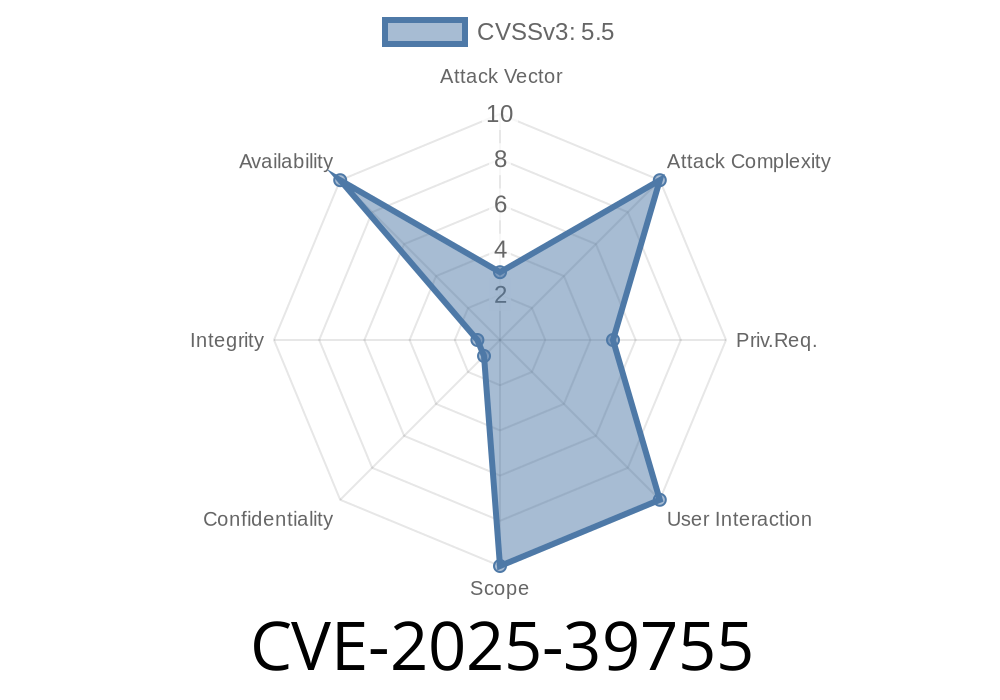The Linux kernel is constantly evolving, bringing new hardware support and bug fixes. Unfortunately, sometimes those improvements also lead to new vulnerabilities. One such issue surfaced in the *staging: gpib* driver code for Linux, impacting devices using the cb721 PCMCIA (PC Card) interface. The problem? An uninitialized struct field that could trigger a kernel "Oops"—the Linux equivalent of a crash.
Recently, this vulnerability was assigned the identifier CVE-2025-39755 and was addressed by kernel maintainers. Let's break down what happened, see why it mattered, and look at how it was fixed.
What Happened: Understanding the Vulnerability
In the kernel's *staging/gpib* code, the pcmcia_driver structure is supposed to contain information about a PCMCIA driver, including a name field. This string is used for identification and is critical for various internal operations, such as registering and managing drivers dynamically.
Originally, the code only set the older .name field inside the drv sub-struct, instead of the correct, newer name field at the top level of pcmcia_driver. When the driver was registered, internal kernel routines (like strcmp, which compares two strings) tried to use this name field.
However, because the field wasn't initialized, it still pointed to NULL. So when pcmcia_register_driver() tried to compare driver names, a function like strcmp() would receive a NULL pointer argument, causing a kernel Oops—leading to a crash and loss of functionality on the system.
In short: Forgetting to initialize a struct member led to a fatal pointer bug.
Here's roughly how the problematic structure looked before the fix
#include <pcmcia/cs_types.h>
#include <pcmcia/cs.h>
#include <pcmcia/cistpl.h>
#include <pcmcia/ds.h>
#include <linux/module.h>
static struct pcmcia_driver cb721_driver = {
.probe = cb721_probe,
.remove = cb721_remove,
.drv = {
.name = "cb721", // Old way; not used anymore
}
};
The Bug: What Goes Wrong?
When pcmcia_register_driver() gets invoked, it performs string operations on driver->name. Since this was never set, we get a crash:
BUG: unable to handle kernel NULL pointer dereference
[...]
Call Trace:
strcmp+x20/x50
pcmcia_register_driver+x40/x100
[...]
The fix is simple but important. Initialize the .name field directly in the pcmcia_driver struct
static struct pcmcia_driver cb721_driver = {
.name = "cb721", // Correct way
.probe = cb721_probe,
.remove = cb721_remove,
};
That's it! Now the kernel always knows the driver's name, avoiding NULL pointer dereference.
How Could an Attacker Exploit This?
This bug most commonly triggers accidentally, but if an attacker had physical access to a system, or could trick it into loading a malicious PCMCIA card or module, it could be used for denial-of-service (DoS). By purposely triggering the registration of a driver with an uninitialized name field, they could force the kernel to crash, reboot, or worse.
However, there's no likely path to privilege escalation or remote exploitation with this specific bug—it's a stability issue, not a direct security threat. But keeping the kernel robust is still vital for system security and reliability.
Kernel Patch Commit:
staging: gpib: Fix cb721 pcmcia Oops (LKML commit)
Linux Kernel Mailing List Discussion:
CVE Details:
Conclusion
CVE-2025-39755 shows how missing a single line of code—a string initialization!—can impact the whole system’s stability. The fix is simple but essential for anyone deploying or running kernels with legacy PCMCIA gear.
If you maintain your own kernel, be sure to upgrade or backport this fix. For everyone else, keep your Linux system updated so small bugs don’t turn into big problems!
For more insights and security fixes, follow Kernel Newbies, LKML, and your distribution’s update notifications.
*Feel free to share this post with fellow Linux admins, embedded developers, or anyone interested in kernel vulnerabilities!*
Timeline
Published on: 04/18/2025 07:15:44 UTC
Last modified on: 04/28/2025 15:32:46 UTC
